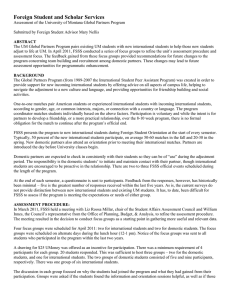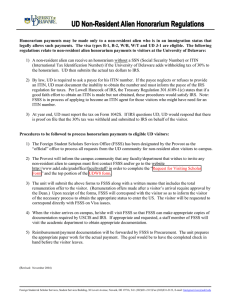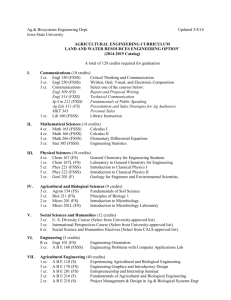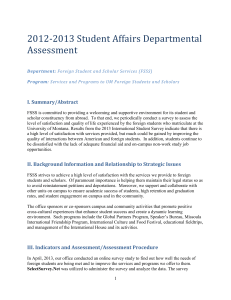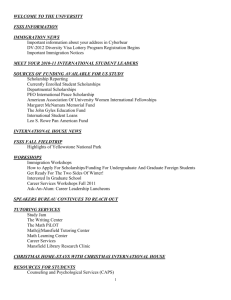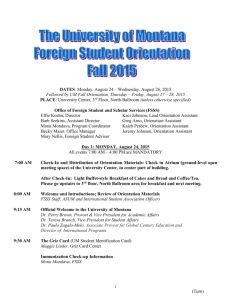Foreign Student and Scholar Services (FSSS) ABSTRACT Submitted by Mona Mondava
advertisement
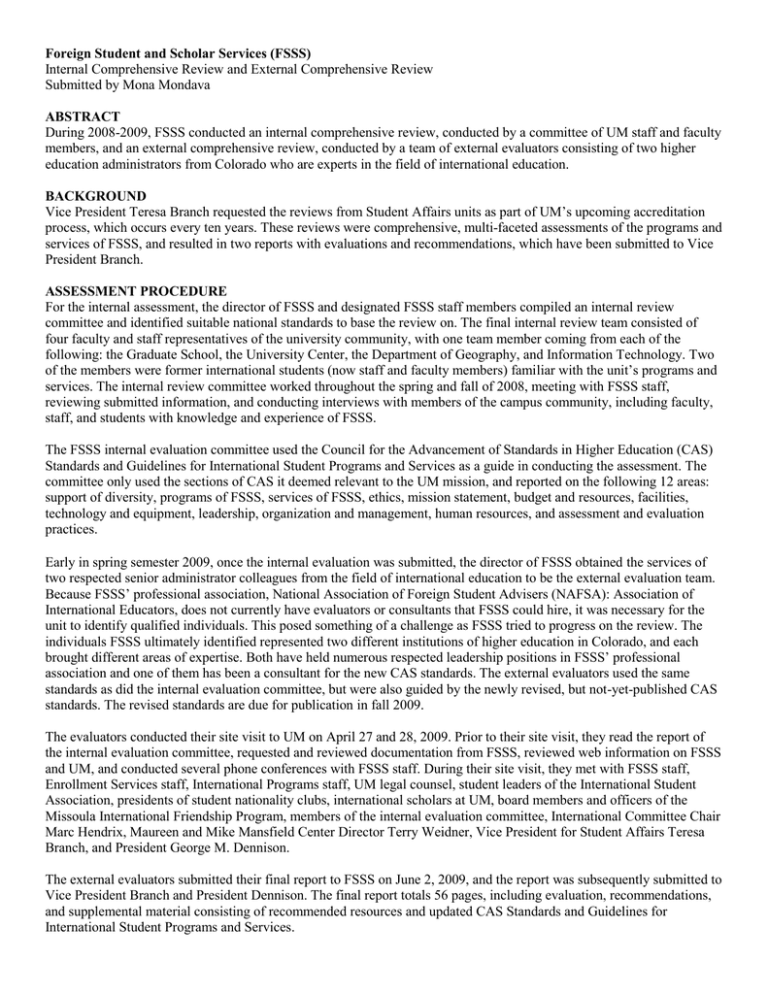
Foreign Student and Scholar Services (FSSS) Internal Comprehensive Review and External Comprehensive Review Submitted by Mona Mondava ABSTRACT During 2008-2009, FSSS conducted an internal comprehensive review, conducted by a committee of UM staff and faculty members, and an external comprehensive review, conducted by a team of external evaluators consisting of two higher education administrators from Colorado who are experts in the field of international education. BACKGROUND Vice President Teresa Branch requested the reviews from Student Affairs units as part of UM’s upcoming accreditation process, which occurs every ten years. These reviews were comprehensive, multi-faceted assessments of the programs and services of FSSS, and resulted in two reports with evaluations and recommendations, which have been submitted to Vice President Branch. ASSESSMENT PROCEDURE For the internal assessment, the director of FSSS and designated FSSS staff members compiled an internal review committee and identified suitable national standards to base the review on. The final internal review team consisted of four faculty and staff representatives of the university community, with one team member coming from each of the following: the Graduate School, the University Center, the Department of Geography, and Information Technology. Two of the members were former international students (now staff and faculty members) familiar with the unit’s programs and services. The internal review committee worked throughout the spring and fall of 2008, meeting with FSSS staff, reviewing submitted information, and conducting interviews with members of the campus community, including faculty, staff, and students with knowledge and experience of FSSS. The FSSS internal evaluation committee used the Council for the Advancement of Standards in Higher Education (CAS) Standards and Guidelines for International Student Programs and Services as a guide in conducting the assessment. The committee only used the sections of CAS it deemed relevant to the UM mission, and reported on the following 12 areas: support of diversity, programs of FSSS, services of FSSS, ethics, mission statement, budget and resources, facilities, technology and equipment, leadership, organization and management, human resources, and assessment and evaluation practices. Early in spring semester 2009, once the internal evaluation was submitted, the director of FSSS obtained the services of two respected senior administrator colleagues from the field of international education to be the external evaluation team. Because FSSS’ professional association, National Association of Foreign Student Advisers (NAFSA): Association of International Educators, does not currently have evaluators or consultants that FSSS could hire, it was necessary for the unit to identify qualified individuals. This posed something of a challenge as FSSS tried to progress on the review. The individuals FSSS ultimately identified represented two different institutions of higher education in Colorado, and each brought different areas of expertise. Both have held numerous respected leadership positions in FSSS’ professional association and one of them has been a consultant for the new CAS standards. The external evaluators used the same standards as did the internal evaluation committee, but were also guided by the newly revised, but not-yet-published CAS standards. The revised standards are due for publication in fall 2009. The evaluators conducted their site visit to UM on April 27 and 28, 2009. Prior to their site visit, they read the report of the internal evaluation committee, requested and reviewed documentation from FSSS, reviewed web information on FSSS and UM, and conducted several phone conferences with FSSS staff. During their site visit, they met with FSSS staff, Enrollment Services staff, International Programs staff, UM legal counsel, student leaders of the International Student Association, presidents of student nationality clubs, international scholars at UM, board members and officers of the Missoula International Friendship Program, members of the internal evaluation committee, International Committee Chair Marc Hendrix, Maureen and Mike Mansfield Center Director Terry Weidner, Vice President for Student Affairs Teresa Branch, and President George M. Dennison. The external evaluators submitted their final report to FSSS on June 2, 2009, and the report was subsequently submitted to Vice President Branch and President Dennison. The final report totals 56 pages, including evaluation, recommendations, and supplemental material consisting of recommended resources and updated CAS Standards and Guidelines for International Student Programs and Services. The external evaluators reported on the following six areas: advising and immigration services, database usage and Student and Exchange Visitor Information Service (SEVIS) Reporting, FSSS programming, campus and external relations, facilities and equipment, and organization and management. FINDINGS The internal evaluation committee submitted the final Internal Review Report to FSSS on February 5, 2009. The report was then submitted to Vice President Teresa Branch to be kept on file in her office, and subsequently submitted to the external review team. The final report consists of forty pages of analysis and recommendations, with additional appendixes of supporting documentation. FSSS received high marks in the areas surveyed, with the main recommendations being in the areas of budget and technology. Overall, the external review team found that FSSS provides quality services and programs to international students and scholars, the campus, and the community. According to the external review team’s report, staff members also exhibit an “image of professionalism and are well respected around campus for their customer service.” In addition, the review team identified some challenges that FSSS is facing with regard to budget, federal compliance, and restrictions on the unit’s abilities to take on more as the international community grows. RECOMMENDATIONS Among the recommendations that emerged from the internal and external reviews is that FSSS needs an adequate budget so that staff may take part in essential professional development activities. This is particularly important in light of immigration regulations, federal compliance issues, liability issues, and the new version of SEVIS, SEVIS II. Because immigration advising is complex and can have significant ramifications for the international student/scholar, it is of vital importance that advising staff have access to the resources that will keep them informed and competent in their jobs. A number of potential revenue streams were suggested in the report, including raising the orientation fee to keep pace with inflation, and introducing a service charge for scholars on a J visa. Another related recommendation dealt with the mandated reporting of student/scholar activities in SEVIS. All users that deal with immigration document issuance or benefits conferral, including the admissions office, FSSS advisers, the Graduate School and the English Language Institute, are urged to use fsaATLAS software to ensure all information is captured on one database that is uploaded to the Department of Homeland Security. That way, manual date entry could be avoided, which would save staff time, prevent duplicates and data errors, and contribute to data integrity.
